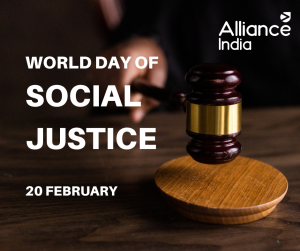World Day of Social Justice 2022: Movement towards achieving Social Justice for People Living With HIV

On February 20, the World Day of Social Justice is observed across the globe. This day is celebrated to raise awareness towards social inequality on gender, sexual orientation, biological prejudice, religion, race, colour, disabilities, region and access to education, fundamental rights, eradicate poverty and create a more socially inclusive society and community. This day is observed to encourage international agencies to explore sustainable growth solutions, reduce poverty, right to work and economic growth, complete social protection and social welfare, and universal availability and accessibility of social well-being, health, education, and equality for everyone. This day has been observed worldwide since 2009.
In the area of HIV, the stigma for transmission of infection and discrimination based on sexuality, HIV status and gender is common, this is not limited to the boundaries of India, but is a universal phenomenon. . In 35% of countries based on the available data, over 50% of people report having discriminatory attitudes towards people living with HIV (Avert, 2021).
With the above background, Alliance India’s Vihaan Care and Support Centres are complementing the mainstreaming activities of NACO in close coordination with SACS. The team from CSCs provide onsite support in case of reported stigma and discrimination by PLHIV and the key population group members. As per the reported numbers, during 2020-21 a total of 456 cases of discrimination was reported by PLHIV across 310 CSCs, and out of that 95% of cases have been addressed by CSCs. In continuation, from April 2021 to December 2021, 493 cases have been reported and more than 94% of cases have been addressed and the remaining are being in various phases of resolution. . It was observed that 47% of cases of discrimination were by family members and the second-highest i.e 28% by the society during social gatherings. To manage these reported discriminations, CSCs have a discrimination response team (DRT) which acts immediately on incidence reporting. CSCs also conduct regular advocacy workshops with various stakeholders through family counselling and awareness program in the society that makes a big difference. Also, gender and sexuality-based discrimination are prevalent in society.
As people living with HIV and people who belongs to key populations face stigma and discrimination, they tend not to access or avail themselves of the various social protection and social entitlement schemes. Social protection and welfare schemes are identified as a support mechanism by the epidemic response program to help alleviate the impact on communities, households, and individuals. HIV/AIDS act 2017 guarantees access to PLHIV to the various welfare schemes. In 2020-21, a total of 1.4 million PLHIV were in active care out of which 89449 were successfully linked to social welfare schemes that included financial protection, treatment, health check-up, and education support. Among the beneficiaries, 45% were male, 44% female, 1% Transgender and 11% children. Many of the social protection and welfare schemes can be expanded to include PLHIV, KPs including Transgender communities.
Alliance India is consistently working for an inclusive community response to PLHIV and Key Population to improve access to quality health care, education, and welfare schemes. Collaborating with various Government stakeholders to achieve access to discrimination-free services. Our efforts are creating change but we have a long way to go.
~Written by Dr. Sukhender Kumar, Programme Officer: Care & Support, Alliance India.
Other Recent Articles
- Yoga for Wellness: Supporting People Living with HIV & NCDs 25 June, 2025
- The Unsung Heroes of HIV Care: Outreach Workers under the Vihaan Programme 8 May, 2025
- Men’s Mental Health Matters in HIV Care 1 April, 2025
- Transforming Lives through Health Interventions: My Visit to Narmadapuram Prison 11 July, 2024
- HIV and Ageing: Understanding the Unique Needs of Older Adults 20 May, 2024
- Youth Voices: Life with HIV in Contemporary India 26 September, 2023
- Empowering Transgender Community to create an Equal World 20 July, 2023
- Combating Stigma and Discrimination Among People Living with HIV 7 July, 2023
- Understanding the Significance of HIV Testing: Impact on Individuals, Relationships, and Society 22 June, 2023
- Empowering Lives during Unrest l Our Commitment to Manipur 5 June, 2023
- Made by Nicdark - Copyright 2020
- donations@ong.com
- volunteers@ong.com
- contact@ong.com
India HIV/AIDS Alliance (Alliance India)
A not-for-profit Section 8 Company with Registration No: U85310DL1999NPL098570
Contact
-
6, Community Centre
Zamrudpur Kailash Colony Extension
New Delhi – 110048 - +91-11-4536-7700
Download
©2021 All Rights Reserved by Alliance India



